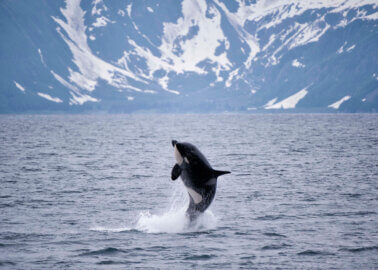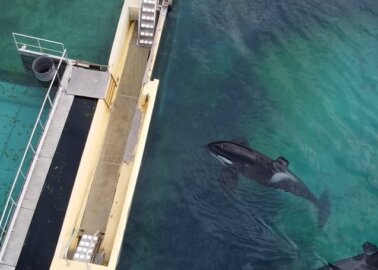Orcas Aren’t the Only Animals Who Suffer at SeaWorld
When people think of the animals who suffer at SeaWorld, they often picture orcas – especially since the documentary Blackfish exposed the horrendous treatment of these intelligent, social beings. But it’s not only orcas who suffer at the marine abusement park – several other species of animals are confined to filthy, cramped tanks and exploited in the name of entertainment, too.
 © Jo-Anne McArthur / We Animals
© Jo-Anne McArthur / We Animals
Dolphins
Orcas are actually a type of dolphin, and 41 of them have died at SeaWorld so far. But the park also imprisons bottlenose and Commerson’s dolphins, who are forced to perform tricks in shows, day after day. Adults and children have been bitten by dolphins during these activities, and since 2008, 53 bottlenose dolphins and five Commerson’s have died at the parks.

Beluga Whales
Eight beluga whales have died at SeaWorld since 2008. Back in 1988, a beluga named Martha was taken from her ocean home off the coast of Canada and shipped to SeaWorld San Antonio, where she was repeatedly impregnated as part of the park’s captive beluga-breeding programme. One of the calves was born a month premature and put on public display just 12 hours after birth. Three weeks later, the baby died.
 © Jo-Anne McArthur / We Animals
© Jo-Anne McArthur / We Animals
Penguins
Penguins are social animals who feed, swim, and nest in groups. They belong in wide, open landscapes, where they can raise their young and spend time in the ocean. But at SeaWorld, they’re confined to small enclosures and forced to live in filthy conditions. Visitors have been known to throw litter into the enclosures, which has sometimes been consumed by penguins and caused life-threatening health problems.
Back in 2011, SeaWorld reportedly tore 10 baby penguins away from their parents and their Antarctic home, claiming that they’d be used for “research purposes”. They’ve been held in captivity ever since.
 © Jo-Anne McArthur / We Animals
© Jo-Anne McArthur / We Animals
Polar Bears
Keeping wide-ranging species like polar bears in artificial environments causes them extreme distress and frustration. In 2017, Szenja, a polar bear held at SeaWorld San Diego, died just weeks after being separated from her companion of 20 years, Snowflake, who was shipped to Pittsburgh Zoo, leaving Szenja isolated, alone, and miserable.
 © PETA US
© PETA US
Sea Lions
Just like the orcas and dolphins, sea lions at SeaWorld are forced to perform tricks in shows.
At SeaWorld, there’s little shade above or below the surface of the water to allow animals to retreat from the scorching sun. Lack of shade can cause myriad health problems, including sunburn, stress, and eye damage.
 © Jo-Anne McArthur / One Voice
© Jo-Anne McArthur / One Voice
Sharks
Sharks can swim up to 45 miles a day, and certain species need to move constantly in order to breathe. SeaWorld confines these intelligent animals to small tanks, forcing them to swim in endless circles or back and forth, and they have been known to sustain injuries to their noses from repeatedly rubbing against the walls. As sharks are sensitive animals with heightened senses, the noisy atmosphere is extremely stressful for them. There have also been several incidents in which sharks have died as a result of avoidable technical failures.
 © Jo-Anne McArthur / We Animals
© Jo-Anne McArthur / We Animals
Other Animals
Countless stingrays, walruses, alligators, manatees, sea turtles, and otters are also exploited at SeaWorld, confined to artificial settings that don’t even come close to their natural environments. These animals face immense distress, and the public are taught the wrong lesson: that animals are ours to do with as we please, which perpetuates speciesist attitudes. It’s never right for a living being to suffer for our entertainment.

What You Can Do
TUI still sells tickets to SeaWorld, supporting the abuse of these animals. As the marine abusement park faces a plunging stock price and a steady decline in visitor numbers, it’s time that TUI followed in the footsteps of numerous other travel providers – including STA Travel and Thomas Cook – and severed ties with SeaWorld.
Please let TUI know your views and urge the company to stop supporting orca abuse:



